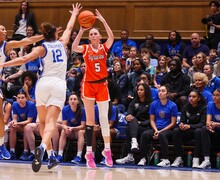Kronos Quartet performs for Belfer anniversary
Photo Courtesy of Jamie Young
The Kronos Quartet performed in the Setnor Auditorium Saturday for the Belfer Audio Archive’s 50th anniversary event. The quartet plays classical music with a modern spin.
A single note on the cello rang through a sold-out Setnor Auditorium, building to a cacophony of sound and supported by a strobe light. This was not your typical string quartet.
The Kronos Quartet performed at 8 p.m. on Saturday in Setnor Auditorium as part of the Belfer Audio Archive’s 50th anniversary weekend celebration. The group, founded in 1973 by violinist and artistic director David Harrington, is known for challenging the conventions of classical music. The quartet is recognized in pop culture for its recording of the “Requiem for a Dream” soundtrack.
The group opened the show with “Spectre” by John Oswald, which uses layered recordings to create a loud, unconventional sound.
“It starts off with one note and ends with one note,” Harrington said during “In Conversation,” an event held earlier that day featuring a conversation between Harrington and New Yorker magazine music critic Alex Ross. “Between those two points, at the loudest moment, there are 1,000 Kronoses going on at the same time. And to my ear, it sounds like a 747 taking off, or something like that.”
In addition to the aural din, the song was accompanied by a sporadic strobe light.
“I really thought I was going to catch a seizure in the opening act,” said Ashley Branch, a magazine, newspaper and online journalism graduate student. “Those lights were killing me. But I have to say, I really enjoyed it.”
Although the concert’s opener was altogether modern, the first half of the show had a World War I theme. Harrington said the idea came up during a conversation with composer Aleksandra Vrebalov about the 100th anniversary of the start of the war. The two thought it should garner some recognition.
That recognition began early in the evening with a World War I bugle track from the Belfer Audio Archive playing at the end of “Spectre” and continuing throughout the next five songs.
The quartet played several songs, including arrangements of “Smyrneiko Minore,” a song originally sung by Greek singer Marika Papagika; “Six Bagatelles,” written by Anton Webern in 1913 and the first piece the quartet ever rehearsed in 1973 and “Trois beaux oiseaux du Paradis” by Maurice Ravel, who wrote about his friends going off to war.
Not only is the quartet working on music from the World War I era, but the group is also recording an album, “Red Hot Bach,” and incorporating technology from 100 years ago.
“When the idea for the ‘Red Hot Bach’ recording was presented to me, it triggered something. And for me, something I’d wanted to do for a long time was to find ways of recording the same performance in a variety of different ways,” Harrington said.
The quartet has been working with Edison cylinders that were developed in the late 1800s, 78 revolutions-per-minute sound recordings, cassettes, digital and cellphone recordings. Harrington said eventually, he hopes to have an app developed where people of all ages can switch from one type of recording to another within the same song to clearly hear the differences in sound quality.
Music critic Alex Ross said during “In Conversation…” that the Kronos Quartet’s use of technology in live performance is far outside of the norm for classical music.
“The incorporation of technology, of electronics, into the concert hall — [audiences] go to the concert hall to escape all of that,” Ross said. “They sort of want to enter this sphere of pure acoustic instruments, and there’s an aspect of traveling back in time in many people’s mentalities. So from the very outset, Kronos had quite a different attitude.”
After the World War I set and an intermission, the quartet performed “Traveling Music” by Ken Benshoof, the first song ever written specifically for them. They finished with “Tenebre” by Bryce Dessner, one of the more recent pieces composed for the group.
The audience members cheered for an encore, and got two. In true Kronos fashion, the quartet closed the show with “Purple Haze” by Jimi Hendrix.
There will be an open forum with the Kronos Quartet from 11:40 a.m.-12:40 p.m. on Monday in Room 404 in Crouse College. The forum will focus on the topic of artist collaboration.
Published on November 3, 2013 at 11:59 pm
Contact Jessica: jmcabe@syr.edu | @Jessica_Cabe





